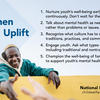May is National Foster Care Month—a time dedicated to raising awareness about the experiences and needs of children and youth in foster care. This month honors the incredible work of those who ensure children and youth in foster care are supported in finding permanent homes and connections. It is also a time to bolster our support for the 463,000 children and youth in foster care in the U.S, ensuring their needs are met and their voices heard loud and clear.
In discussions around foster care, one crucial aspect often gets overlooked: the distinct obstacles faced by young people in foster care who are trying to access higher education.
It's not just up to individuals or agencies to support these students. We need a collective, systemic, collaborative ecosystem of support.

Renny Osuna Perla
Project Coordinator
In past roles, I had the privilege of working and learning alongside devoted attorneys and social workers who were striving to establish stable and nurturing permanent environments for foster children. During that time, I contributed to a policy and research team to enhance support for youth—including those with foster care involvement—as they reintegrate into school after leaving residential placements in the juvenile justice, child welfare, and behavioral health systems. These experiences showed me the vital role of community advocacy for students exiting these systems and achieving successful school reentry. In other words, it's not just up to individuals or agencies to support these students. We need a collective, systemic, collaborative ecosystem of support.
Last month, I attended the “Philly Foster Care to College with the Pennsylvania Higher Education Assistance Agency (PHEAA)” virtual event. This gathering brought together advocates from the secondary and postsecondary sectors, all focused on assisting students in Philadelphia’s foster care system to navigate the higher education financial aid process.
Reflecting on the insights shared by various speakers and panelists, the event was eye-opening as it highlighted the importance of support programs and reviewed financial aid scenarios specific to youth with foster care backgrounds. Pennsylvania Senator Vincent Hughes and State Representative Jordan Harris gave remarks stressing the need for legislative support for foster care students and their dedication to funding higher education in Pennsylvania. The event also shed light on pivotal financial aid opportunities like the Chafee Education and Training Grant Program and the PA Fostering Independence Tuition Waiver Program for foster students.
This event wasn’t just informative; it was a call to action, emphasizing the critical role of legislative support, institutional initiatives, and community engagement in ensuring equitable access to higher education for all foster students.
Understanding the Challenges
Alarmingly, only a small number of students with experience in foster care access higher education opportunities, and even fewer successfully graduate from college. Students who have been in foster care are overall less likely to obtain a degree within six years. Only a small percentage, ranging from 3% to 4%, of individuals who have aged out of foster care attain a bachelor's degree. An even smaller percentage, between 2% and 6%, earn an associate's degree.
It’s not a lack of interest that stops foster students from accessing higher education; it’s a myriad of challenges. Studies show that students who have experienced the foster care system want to pursue an education. Eighty-four percent of adolescents aged 17 to 18 in foster care want to attend college—only 20% fulfill that ambition.

The complexities of the higher education system pose significant challenges for foster students. Many of these students encounter barriers and find themselves constrained by a system that fails to acknowledge foster students’ capacity and autonomy in making decisions. These students deserve a more empowering and supportive approach from higher education institutions—one that sees them as humans first.
Foster students face challenges every step of the way, even before entering college. Often, students are unprepared for their transition to college due to disruptions in their K-12 education and various foster care placement changes. When applying to college, students find themselves unprepared for the transition due to managing adulthood and financial independence with minimal familial support. Financial strain forces many to juggle extensive work hours with coursework, and a significant portion of foster students also bear parental responsibilities.
When they finally arrive at college, many students with foster care backgrounds are forced to focus on meeting their own basic needs instead of their education. Too often, young adults aging out of foster care face unemployment, homelessness, and do not have familial support. Without basic needs supports, students may not have access to the necessary guidance and resources to successfully transition into college life. Financial constraints also pose significant barriers, making it difficult for students to afford tuition, textbooks, and other essential expenses. Those who do enroll in college successfully and with support are often required to take which add time and cost to attaining a degree, further impeding progress.
The Importance of Awareness and Resources
Colleges and universities play a key role in supporting foster students. Institutions must recognize the importance of creating supportive and inclusive environments. This means raising awareness about their experiences and advocating for policies and practices that promote success for students coming from foster care. It also involves cultivating a sense of belonging and community by establishing campus supports for foster students.

As we note in our 2024 Federal Policy Priorities, policymakers and advocates can support students by removing barriers that often hinder populations from accessing opportunities. Recent legislation such as the "Higher Education Opportunities for Foster and Homeless Youth Act" address and provide pathways for entry and support throughout their higher education experience.
States such as California, Minnesota, Nevada, and Pennsylvania have introduced fee waivers for former foster students to attend college, but there is still more work that needs to be done. Initiatives like the Chafee Education and Training Voucher (ETV) program offer financial assistance of up to $5,000 annually to students who have foster care backgrounds for their postsecondary education expenses. However, the value of the voucher has not kept pace with the rising cost of attending college. Advocates have urged for enhanced efforts to reach out to students and raise awareness of the ETV program, as many students might not be aware of this resource. Additionally, there is a push for an overall increase in program funding, which requires additional financial support and policy measures aimed at eliminating barriers to access.
As May ends and we celebrate all the foster students, families and those who have contributed and continue to advance the vital groundwork in mitigating foster students’ challenges, our commitment to supporting foster care students does not stop here. It’s a call to action for everyone–institutions and individuals alike–to step up and make a difference. By offering practical support, spreading awareness, and fostering inclusivity, we can ensure that every foster care student has the opportunities and resources necessary to succeed and make their college pursuits attainable.


